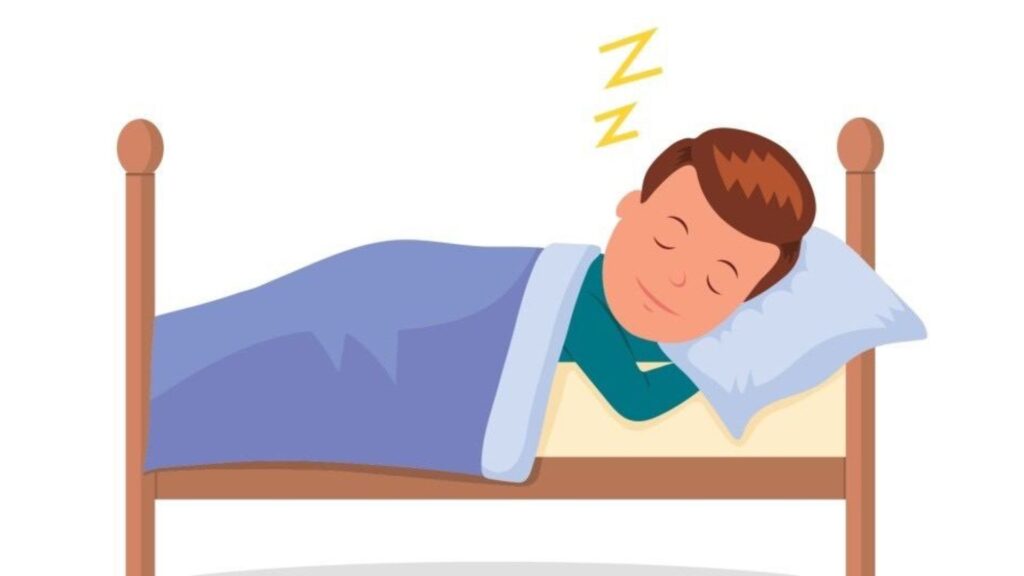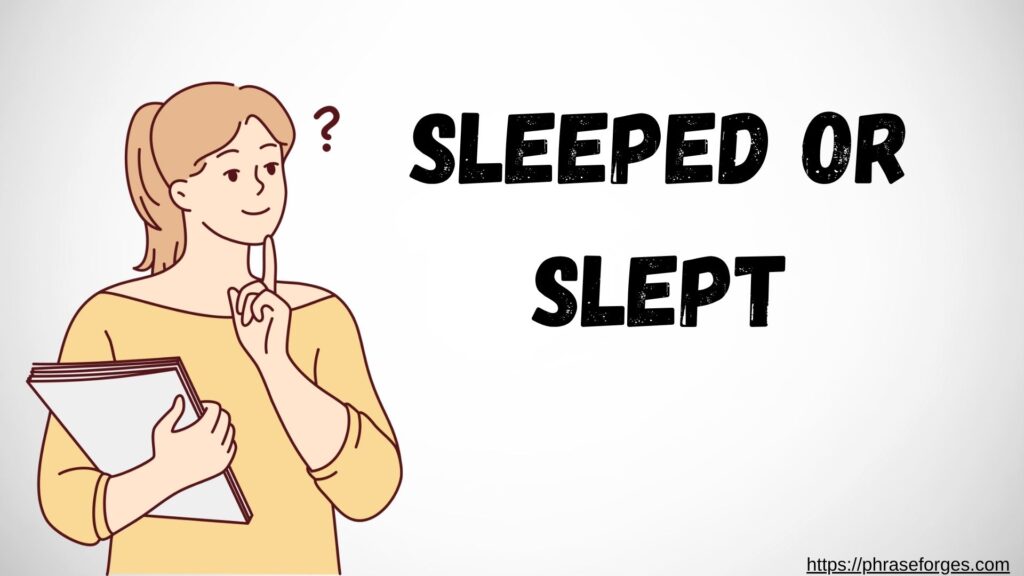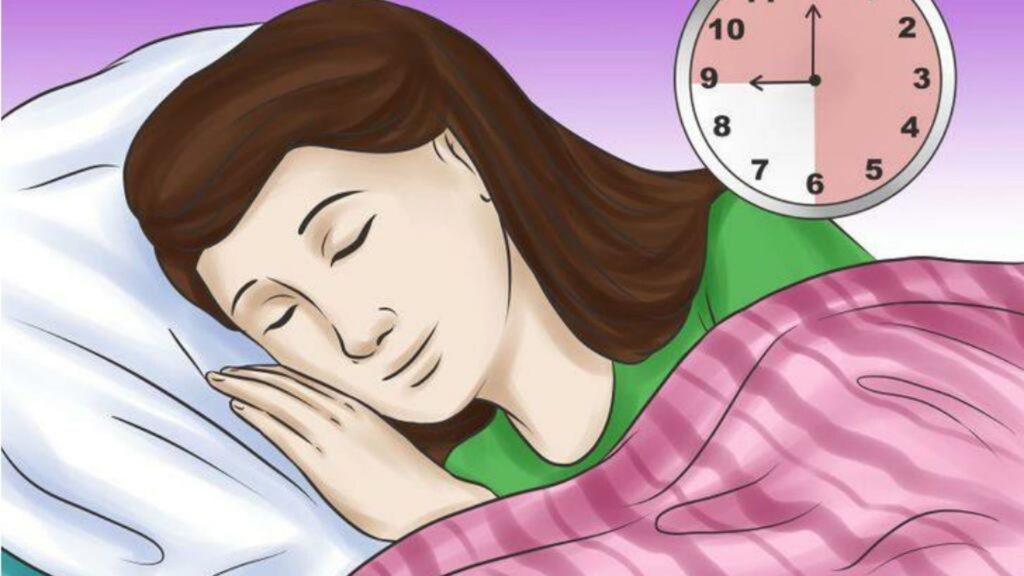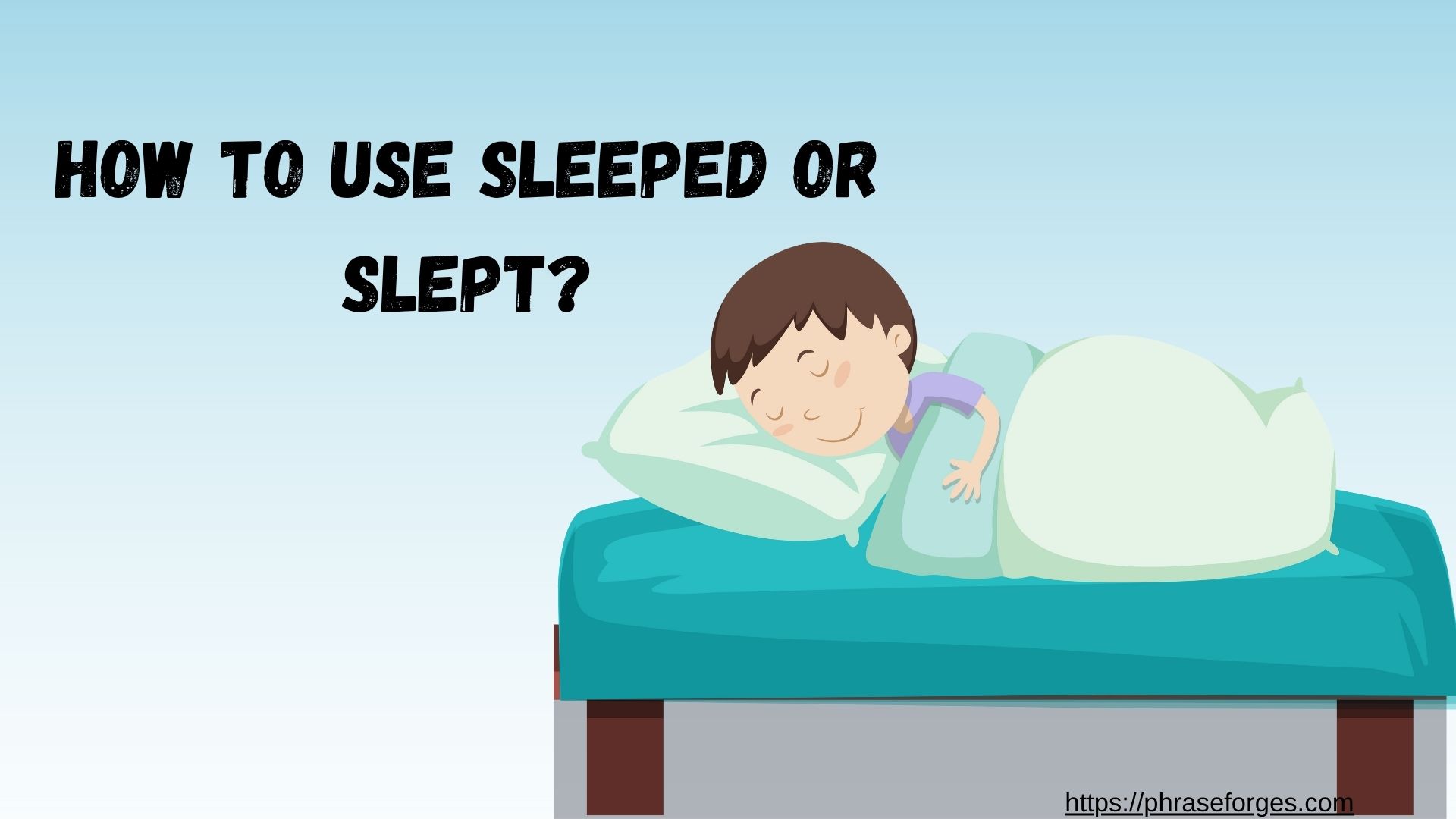Sleeped or Slept? Keyword + Intro Explanation

Let’s face it English verb forms can be sneaky. One moment you’re confidently using the past tense, and the next, you’re wondering if it’s “sleeped” or “slept.” Spoiler alert: only one of those is correct.
So, is it sleeped or slept?
✅ The correct past tense of sleep is slept.
❌ “Sleeped” is a common error caused by trying to apply regular verb rules to an irregular verb.
But don’t worry we’re going to break down why this happens, how to use “slept” correctly, and when to avoid the trap of over-regularization.
Simple Definition + Usage Overview
Sleep is an irregular verb. That means it doesn’t follow the usual -ed ending rule most regular verbs do in the past tense.
| Base Form | Past Tense | Past Participle |
|---|---|---|
| sleep | slept | slept |
So, whether you’re saying “I slept early” or “I have slept well”, slept is always the correct choice not sleeped.
Clear Rules & Patterns

Let’s dig into the structure and timeline of how “sleep” changes across English tenses. This is where grammar meets clarity.
🔹 Verb Conjugation Table: “Sleep”
| Tense | Example Sentence |
|---|---|
| Present Simple | I sleep at 10 PM. |
| Present Continuous | I am sleeping right now. |
| Past Simple | I slept early last night. |
| Present Perfect | I have slept only two hours. |
| Past Perfect | I had slept before the call arrived. |
| Future Simple | I will sleep after the movie. |
| Future Continuous | I will be sleeping by then. |
| Present Perfect Continuous | I have been sleeping all day. |
| Past Perfect Continuous | I had been sleeping when it rained. |
| Future Perfect | I will have slept before sunrise. |
| Future Perfect Continuous | I will have been sleeping for hours. |
As you can see, “slept” is used in both the simple past and the perfect tenses.
Bulleted Rules with Do’s and Don’ts
✅ Do Use “Slept” in These Cases:
- To describe a past action (e.g., “I slept on the bus.”)
- In perfect tenses (e.g., “She has slept for 10 hours.”)
- When forming conditional or reported speech (e.g., “If he had slept earlier…”)
❌ Don’t Use “Sleeped”:
- It’s grammatically incorrect.
- Even though it feels like it should follow the -ed rule (like “talk” → “talked”), “sleep” is irregular.
Multiple Example Sentences
Here’s how you use slept correctly in real-life contexts:
- “I slept through the entire flight to Chicago.”
- “By the time the guests arrived, he had slept for hours.”
- “We have slept in that cabin before it’s cozy and quiet.”
- “Next time, I will have slept more than five hours.”
Let’s also highlight a few incorrect uses:
- ❌ “I sleeped too late last night.”
✅ “I slept too late last night.” - ❌ “He has sleeped in his office again.”
✅ “He has slept in his office again.”
Before/After Examples in Everyday and Formal Contexts
📧 Email Example – Informal (Everyday Use)
Subject: Missed the Morning Meeting
Hi Josh,
Sorry I wasn’t online for the 9 a.m. call I accidentally slept through my alarm. Totally my fault. I’ll catch up with the notes and make sure it doesn’t happen again.
Best,
Trina
✅ Natural, casual, and uses the correct past tense of sleep.
📝 Report Example – Formal (Business Use)
Excerpt from a research report:
Participants who slept fewer than six hours showed a 25% decrease in cognitive performance compared to those who had slept seven to nine hours the night before.
Using slept and had slept shows proper command of tense consistency.
Common Mistakes & Fixes
Many learners mix up irregular and regular verbs, leading to over-regularization.
Here are some quick fixes:
| Mistake | Fix |
|---|---|
| I sleeped at my desk. | I slept at my desk. |
| They had sleeped on the couch. | They had slept on the couch. |
| Have you ever sleeped outside? | Have you ever slept outside? |
🧠 Tip: If a verb is irregular, check its past tense and participle forms before guessing. Verbs like dream, burn, and leap follow similar irregular or dual patterns (e.g., dreamt/dreamed).
Quick Reference Table
| Verb | Past Tense | Past Participle | Correct Usage |
|---|---|---|---|
| sleep | slept | slept | I slept well. |
| dream | dreamed/dreamt | dreamed/dreamt | She dreamed big. |
| burn | burned/burnt | burned/burnt | We burned papers. |
| leap | leapt/leaped | leapt/leaped | He leapt over it. |
Why Is “Sleep” an Irregular Verb?

The word “sleep” comes from the Old English “slæpan”, derived from Proto-Germanic slēpanan. Over centuries, many English verbs evolved unique past forms that didn’t adopt the common -ed suffix. That’s what makes sleep an irregular verb.
These patterns were preserved over time for frequently used verbs go/went, eat/ate, sleep/slept because people used them so often they resisted change.
English Grammar Exercises
Let’s practice identifying the correct form. Which of these is right?
- Last night, I (sleeped/slept) in a hammock.
- He (has sleeped/has slept) over at his friend’s house.
- We (will have sleeped/will have slept) by the time they land.
Answers:
- slept
- has slept
- will have slept
Use these as warm-up exercises for teaching or brushing up on irregular verb forms.
Recap: Is Sleeped Correct?
To wrap it up:
- Sleeped ❌ is incorrect. It’s a regularized mistake.
- Slept ✅ is the proper past tense and past participle of sleep.
Final Thoughts
Mastering irregular verb forms like sleep/slept is key to sounding fluent and natural in English. While it’s tempting to apply -ed to everything, remember that irregular verbs break the rule and that’s okay. They’re just the quirky side of English grammar.
So next time someone says, “I sleeped late,” you’ll know exactly how to correct them with confidence.

